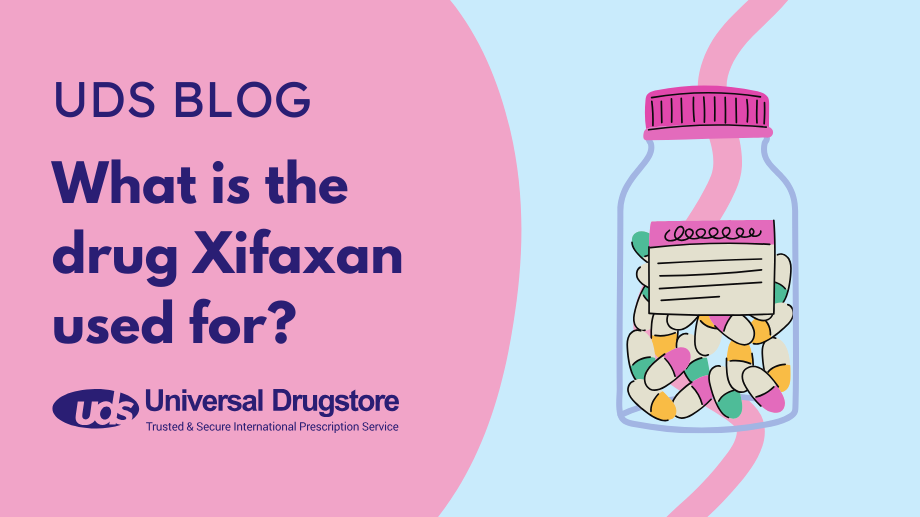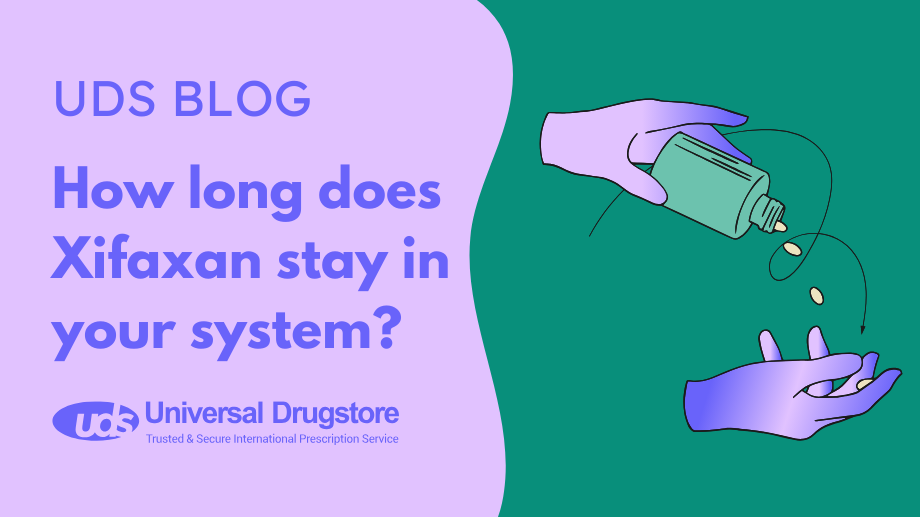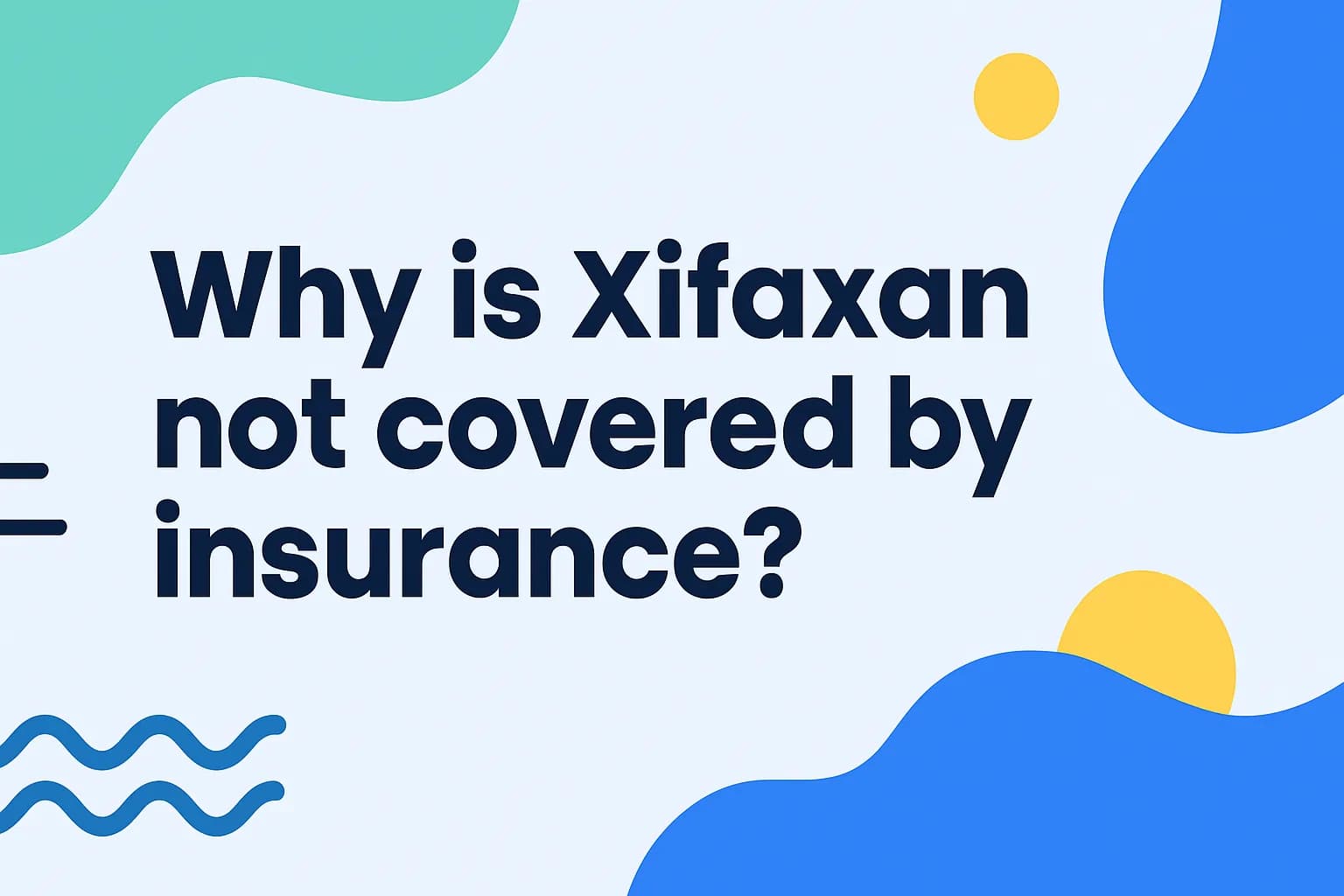What is Xifaxan used for?

Xifaxan (rifaximin) is a brand-name antibiotic used to treat various gastrointestinal (GI) conditions. One of its main uses is the treatment of traveler’s diarrhea caused by E. coli bacteria. Xifaxan works by inhibiting the growth of bacteria in your intestines.
In addition to traveler’s diarrhea, Xifaxan is also prescribed for the management of hepatic encephalopathy, a brain disorder that can occur due to severe liver disease. In this condition, your liver is unable to remove toxins from the blood, leading to changes in your mood, behavior, impulse control, memory, concentration, and coordination. Xifaxan may also be used in the treatment of irritable bowel syndrome with diarrhea (IBS-D). IBS-D is a type of irritable bowel syndrome (IBS), a common GI disorder that affects your large intestine (colon). IBS-D can cause recurrent abdominal pain or discomfort, along with frequent bowel movements.
It is important to note that Xifaxan should be taken at the prescribed dosage and duration as told to you by your healthcare provider. As with any medication, there may be potential side effects or interactions with other drugs, so you should discuss your medical history and any other medications you are taking with your healthcare provider. Keep reading as we discuss these important points and answer some frequently asked questions.
Xifaxan FAQs
What conditions is Xifaxan commonly prescribed for?
Xifaxan is FDA-approved to treat:
- Travelers’ diarrhea that is caused by an overgrowth of bacteria called Escherichia coli (E. coli).
- Hepatic encephalopathy (HE). Xifaxan is generally used in combination with Enulose (lactulose) to treat this condition.
- Irritable bowel syndrome with diarrhea (IBS-D).
What are the side effects of Xifaxan?
The most common side effects of Xifaxan seen in clinical trials when compared to placebo include:
- Headache
- Nausea
- Swelling in hands and feet
- Dizziness
- Tiredness
- Bloating and gas
- Increase in liver enzymes
Other possible side effects of Xifaxan include:
- Constipation
- Fever
- Muscle spasms
- Itching
- Stomach pain
- Depression
- Sore throat and runny nose
- Joint pain
- Fever
- Rash
Rarely, Xifaxan may cause serious side effects such as:
- Serious, life-threatening allergic reactions, including anaphylaxis.
Symptoms of anaphylaxis may include hives, skin rash, swelling of your face, lips, tongue, or throat, and shortness of breath. Seek immediate medical attention if you experience any symptoms of a serious allergic reaction.
Worsening traveler’s diarrhea
Xifaxan only works to treat travelers’ diarrhea caused by a bacteria called Escherichia coli (E. coli). But other bacterial infections can cause travelers’ diarrhea and Xifaxan will not be effective against those.
If your diarrhea symptoms get worse or persist for more than 24 to 48 hours, discontinue Xifaxan and consider alternative antibiotics.
C. difficile diarrhea
All antibiotics, including Xifaxan, can cause diarrhea from a bacteria called Clostridium difficile (C. diff). Diarrhea from C. diff is a serious infection that can lead to life-threatening colitis and it requires immediate medical attention.
Get medical help right away if you have symptoms such as increased heart rate, foul-smelling diarrhea, nausea, fever, and frequent bowel movements (even up to 15 times per day).
These are not all of the possible adverse events of Xifaxan. You should always seek medical advice from a healthcare professional for any questions or concerns about your medical condition or treatment. You should also read all the patient information, including your Medication Guide that comes with Xifaxan. You can report side effects to the FDA at 1-800-FDA-1088 or www.fda.gov/medwatch.
How does Xifaxan work?
The active ingredient in Xifaxan is rifaximin, which is a rifamycin antibiotic. It kills bacteria by stopping them from making important proteins they need to survive.
What should you tell your healthcare provider before taking Xifaxan?
You should not take this medication if you have an allergy to rifaximin, any of the inactive ingredients in this product, or if you are allergic to medications such as Mycobutin (rifabutin), Rifadin (rifampin), or Priftin (rifapentine).
Shop Medications
You should be sure your healthcare provider is aware of all your medical conditions as they may be contraindications or you may need increased monitoring during treatment, including:
- Liver disease. Having a severe liver problem can raise the level of Xifaxan in your blood, which could increase your risk of side effects.
- If you are pregnant or plan to become pregnant. It is not known whether Xifaxan is safe to take during pregnancy.
- If you are breastfeeding or plan to breastfeed. It is not known whether Xifaxan passes into breast milk or the effects it may have on your breastfed infant.
Are there any drug interactions with Xifaxan?
When Xifaxan is taken with other prescription drugs, over-the-counter medications, vitamins, herbal products, and supplements, it may change how they work or increase the risk of side effects. Tell your healthcare provider about all your current medications, including:
- P-glycoprotein and/or OATP inhibitors such as cyclosporine
- Warfarin
This list is not complete and many other drugs may interact with Xifaxan.
What is the dosage for Xifaxan?
Your dose of Xifaxan will be determined by your healthcare provider based on the condition being treated. Xifaxan is available in 200 mg and 550 mg tablets.
The typical dose of Xifaxan is as follows:
- Travelers’ diarrhea: The typical dose is Xifaxan 200 mg by mouth three times daily for 3 days.
- Hepatic encephalopathy: The typical dose is Xifaxan 550 mg by mouth twice daily.
- Diarrhea in irritable bowel syndrome (IBS-D): The typical dose is Xifaxan 550 mg by mouth three times daily for 2 weeks. If your symptoms come back, you may try this dose again for up to 2 more times.
What if you miss a dose of Xifaxan?
The manufacturer of Xifaxan has not provided recommendations for a missed dose. If you miss a dose of this medication, talk with your healthcare provider or pharmacist. They can advise you on whether you should take the missed dose of Xifaxan or skip it and wait for your next dose.
However, you should not miss any doses of Xifaxan. That can cause it not to work as well at treating your condition.
How should you store Xifaxan?
Xifaxan should be stored at room temperature between 68°F to 77°F (20°C to 25°C). You can also store it between 59°F to 86°F (15°C to 30°C) for short periods if needed. As with all medications, keep Xifaxan out of the reach of children.
Is weight gain a possible side effect of Xifaxan?
No, you are not likely to cause weight gain while taking Xifaxan. Weight gain was not reported in clinical trials of this medication. However, Xifaxan may cause some people to build up fluid in their body. In turn, this can cause weight gain. If you notice any unusual swelling or weight gain, contact your healthcare provider.
What should you do if you take too much Xifaxan?
If someone has overdosed and has serious symptoms such as trouble breathing or passing out, call 911 immediately. Otherwise, call a poison control center right away at 1-800-222-1222.
What is the typical course of treatment with Xifaxan for IBS?
Xifaxan can be used for people who suffer from irritable bowel syndrome with diarrhea (IBS-D). The typical dose to treat this condition is Xifaxan 550 mg by mouth three times daily for 2 weeks. If your symptoms return, you can try this course of treatment up to 2 more times.
Related Medications
- Immodium (loperamide)
- Bentyl (dicyclomine)
- Levsin (hyoscyamine)
- Levsin SL (hyoscyamine SL)
- Nulev (hyoscyamine)





